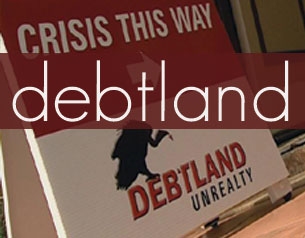Debtland
Mortgages doled out to people on the breadline, loans to refugees with no English and no jobs, reams of maxed out credit cards; welcome to Debtland.
 Mortgages doled out to people on the breadline, loans to refugees with no English and no jobs, reams of maxed out credit cards; welcome to Debtland. But this is not America's sub-prime meltdown. We are in Australia, investigating the country's own subprime crisis, every bit as extraordinary and outrageous as America's.
Mortgages doled out to people on the breadline, loans to refugees with no English and no jobs, reams of maxed out credit cards; welcome to Debtland. But this is not America's sub-prime meltdown. We are in Australia, investigating the country's own subprime crisis, every bit as extraordinary and outrageous as America's.
"We've lost everything. It's all gone. It sucks. It's not right. It's just not right." These are the distraught words of Dianne Davies. Unable to pay their first mortgage, she and her husband took out a second - but this only dragged them deeper. Her young family is now living in a neighbour's garage, hoping that the sale of their home might raise enough capital to pay off their debts.
Home repossessions and forced sales have been symptoms of financial crises for decades. But this time around there seems to be an added twist to the screw, a twist which has left around 300,000 Australian households at risk. The difference is the attitude of mainstream high street banks towards lending. A glut of "cheap money" that appeared on the market post 9-11 encouraged increased numbers of loans, "we lent to whoever we could and as much money as they wanted" admit the banks.
The results of this no-holds barred approach are devastating. Deng Gatluak and his family fled to Melbourne from war torn Sudan. "When I came in Australia I didn't know English, but when we went to the bank they gave me the form and I signed it." The crippling repayments on a $20,000 car loan have left him living on $3 a day. Susan is a middle aged mother on a disability pension, "I was amazed that somebody would give me a loan for nearly $200,000", but lend the money they did, and she is now poverty stricken and facing eviction.
Saddled with repayments, debtors turn to credit cards. "I'm finding clients that come in with multiple creditors, nine credit cards, and I'm thinking, who's doing the credit checking? What are they doing?" demands one financial consultant we speak to.
Kim White is a former bank employee. His insight into the workings of the lending market is frightening, "We would see people coming through, and you know that they're going to live on their credit card for their basic expenses, and get themselves into worse debt. But the bank would say do it or else you're going to be fired."
Debtland is a story of the clash of aspiration and greed, of consumers who perhaps should have known better, exploited by banks who did know better. It is the story of the collapse of dreams which should never have been dreamt.
FULL SYNOPSIS
